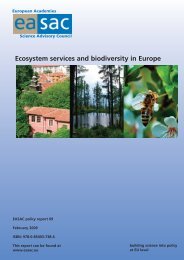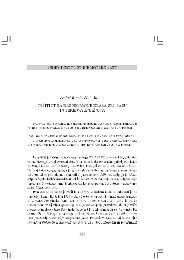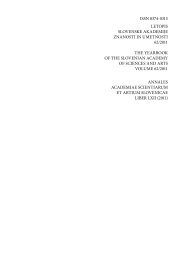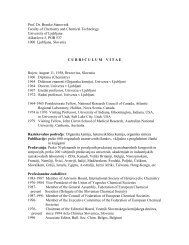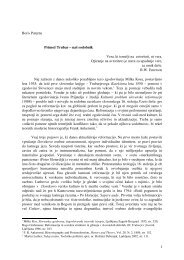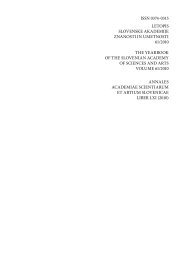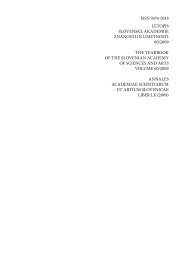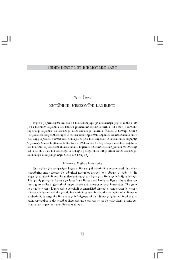Taking Inquiry-Based Science Education into Secondary ... - SAZU
Taking Inquiry-Based Science Education into Secondary ... - SAZU
Taking Inquiry-Based Science Education into Secondary ... - SAZU
Create successful ePaper yourself
Turn your PDF publications into a flip-book with our unique Google optimized e-Paper software.
14<br />
<strong>Taking</strong> IBSE <strong>into</strong> <strong>Secondary</strong> <strong>Education</strong><br />
• Communication through the written word via computers or mobile ‘phones cannot replace the direct<br />
sharing of experience and ideas through talk, discussion and argumentation. The immediacy of talk has<br />
a different role in learning than asynchronous communication through computers.<br />
This last point was reinforced in the conference by frequent reference to the value of students working<br />
in groups and forming their ideas collaboratively. If they work only alone they are missing an important<br />
contribution to their understanding from fellow students. This point was illustrated by the experience of a<br />
mathematics professor at a US university 34 who noted that his African-American students were consistently<br />
performing at a lower level than comparable Chinese students. He tested various hypotheses about the<br />
causes, such as family support, motivation, income and preparation and, finding no support for them, he<br />
studied their study habits. He observed that the African-American students studied by themselves while the<br />
Chinese students spent at least a third of their study time discussing their work in groups. He helped the<br />
African-American students to study in groups and after a period of time their results of improved to a level<br />
comparable with the Chinese students.<br />
Thus it is important that arrangements for study, whether or not assisted by computers, avoid isolating<br />
learners from each other. The aim to produce life-long learners, who understand what is involved in learning,<br />
should be seen as the development of autonomy rather than independence in learning.<br />
5.3 Relevance of the content as seen by students<br />
Absence of relevance is a common complaint of students about their science lessons and a reason for<br />
lack of desire to continue studying science beyond school. What is seen as relevant by teachers and<br />
other adults may not be perceived as such by young people. Relevance can have various meanings in<br />
this context. It may mean ‘surface’ interest, or that curiosity is aroused, or that there is evident application<br />
beyond the classroom. There is a difference between relevance of the subject matter of a topic, on one<br />
hand, and the skills and understanding being developed, on the other. The latter may not be taken <strong>into</strong><br />
account by learners in judging relevance. What students perceive as what they are learning – and whether<br />
they see it as worth learning – will be influenced by the topic and context in which the skills and knowledge<br />
to be developed are embedded. For instance, finding the density of an object by weighing it in air and then<br />
in water may not be seen as engaging in itself, but may become so in the context of the story of the life of<br />
Archimedes of Syracuse or set as a problem to solve in the investigation of fake coins.<br />
Relevance can also mean ‘real’ in the sense of being part of life. Visits to work places, such as factories, laboratories,<br />
farms and recycling plants, where science and technology are used enable students to see the applications<br />
of science in producing the food, medicines, clothes, utensils and equipment that we use in everyday life.<br />
Similarly, field studies in the natural environment provide experiences which give studies of habitats, climate<br />
and interdependence a meaning in real terms. Conference participants also mentioned summer camps and<br />
the role that scientists can have in making the link between school science content and real life. Visits or on-line<br />
discussion with scientists or technologists working in various fields, such as communications, food or sport,<br />
can help students to recognise why they need to understand key ideas. It is particularly useful for students to<br />
hear about the application of science in topics which they do not normally consider to involve science.<br />
The interests of adolescents are different in many ways from the interests of primary school pupils. They<br />
are also mixed and contradictory, influenced by the physical, emotional, neurological and social changes<br />
taking place at puberty. So, their interests will be very much centred on themselves, on their appearance,<br />
diet, sport, music and their relationships with their peers. At the same time, their developing ability for<br />
abstract thinking and their rapid cognitive development bring interest in local and global environmental<br />
issues, such as conserving energy, recycling, and protecting endangered species. These developments<br />
34 Treisman 1992<br />
Report on the conference, York, UK, October 27-29 2010



